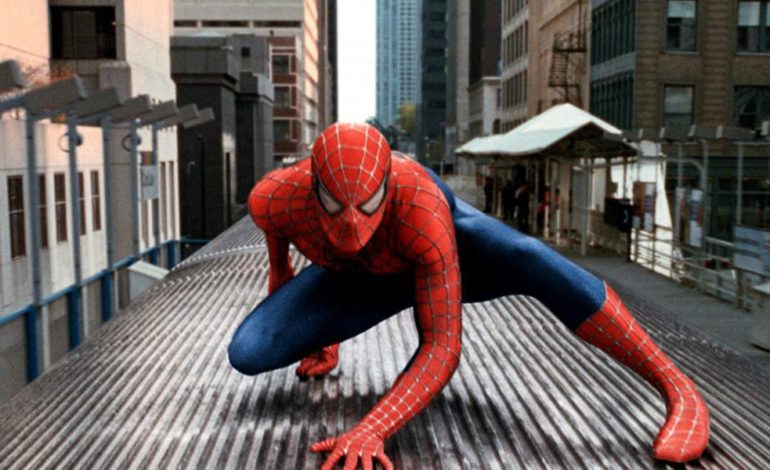

June 30th marks the 15-year anniversary of Spider-Man 2, the undisputed best film in Sam Raimi’s Spider-Man trilogy. Despite the passage of time, this film remains in high regards, laying the groundwork for so much of what we see in our oversaturated world of superhero films. Even the late Roger Ebert declared Spider-Man 2 “the best superhero movie since the modern genre was launched with Superman (1978).” With Spider-Man: Far From Home around the corner, Mxdwn writers Rick Rices, Drew Mattiola and I looked back at the film and discussed what worked, what hasn’t held up and why its legacy remains strong after all these years.
Ben: It’s been fifteen years since Spider-Man 2 was released in theaters. It came out in a much different landscape of cinema, where superhero films were occasional rather than a billion dollar franchise. Yet even in the pre MCU-era, this film remains a gold standard of the genre. Why do you guys think that is?
Rick: This was a time when the superhero genre was starting to become interesting. We had Batman, Superman and even Blade but it was Men in Black that started it all which was owned by Marvel Comics. When Spider-Man first released in 2002 it was groundbreaking. It’d been in development hell for over twenty-five years. With the sequel though, we had themes that are now present in today’s superhero films. Questioning if you want to be a hero, the cost of that responsibility and the decision to face your destiny or leave it all behind. The villain was great and the writing felt more like an action/adventure film instead of a superhero type film. This was a superhero movie for people who don’t watch superhero films.
Drew: I think Spider-Man 2 gave us one of the great comic book rivalries of all time and, in turn, put Doc Ock and Spider-Man on the silver screen. We’ve seen great rivalries but none of this proportion or scale before the MCU. This was our definitive Spider-Man and the castings only added to these personas we read through the comics.
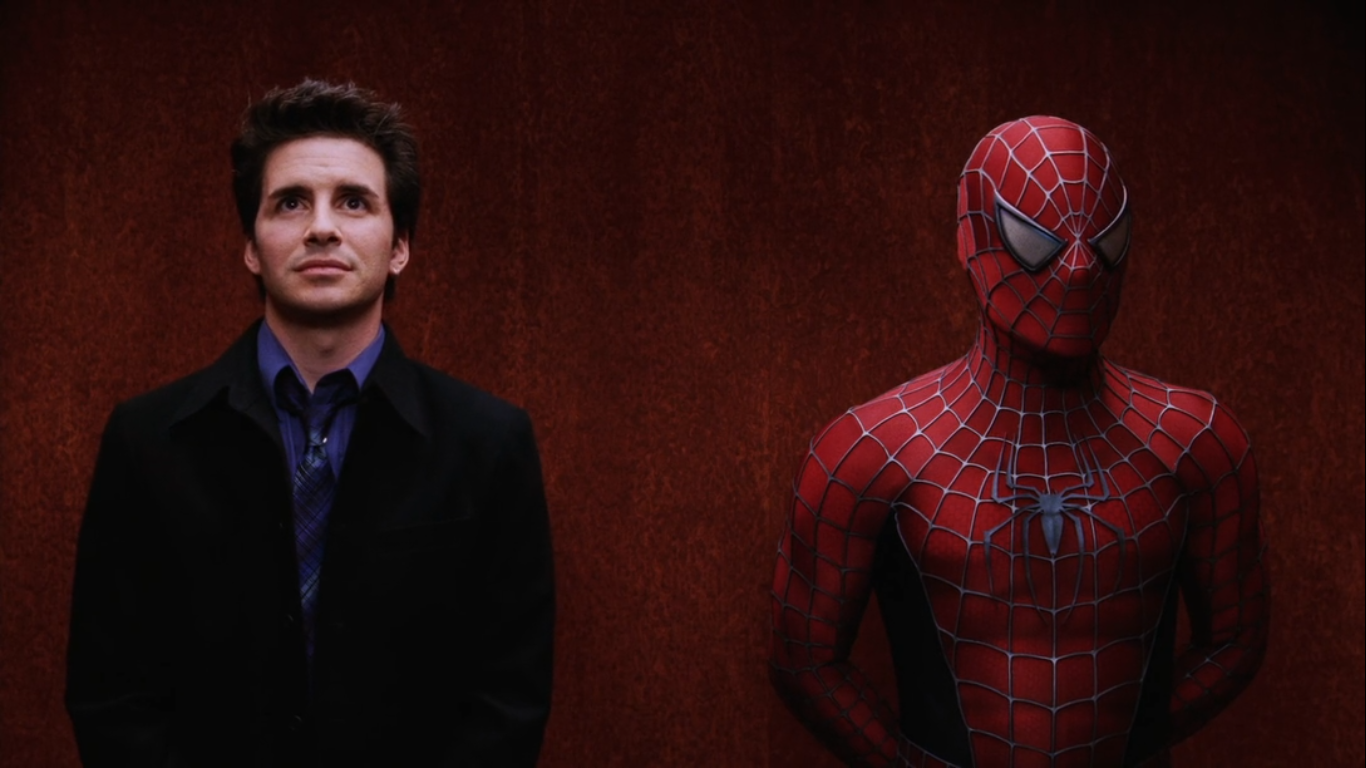

Ben: It’s true, Spider-Man 2 marked the point where, even though the genre was regaining steam, its penchant for solid storytelling became apparent. Sam Raimi’s first Spidey film showed that, like the original Superman film, these movies didn’t have to be wholly dark to be appreciated. There was pathos yes, but also a silly side that embraced the weirdness of comic book heroes, red and blue costume and all. But Spider-Man 2 took that pathos and, as Rick mentioned, further analyzed the responsibility of being a hero. How do we think Peter Parker’s journey in this entry built upon his earlier development?
Rick: One of the reasons why I enjoy this movie as much as I do is the script. Peter Parker isn’t this rich person, or has a facility where he can design everything he needs. He’s just an ordinary guy. He’s struggles with work and paying the rent, he truly loves Mary Jane but can’t bring himself to do so and wants to do the right thing. This movie examines what it means to be a hero not just anyone wearing an outfit. I love the moment where Peter abandons his costume in favor of living a normal life. It also talks about what’s important in life. Do we save the world or let the world just go on? I believe that all of the MCU takes credit from Spider-Man, which is probably why I love this movie more than any of those films. It was the first of its kind. Not to mention that the first film introduced the flipping pages of the comic book in the opening sequence.
Drew: I agree with Rick. The film examines Peter’s journey through morals and values established in the previous film and succeeds in doing so because it illustrates our sacrifices. Peter sacrifices his duties as a hero for the ones he loves. It is a battle of selflessness and selfishness.
Ben: A lot of this emotional impact comes from the performances of its characters. Outside say the 90’s animated series, these were some of the definitive Spider-Man interpretations. Toby Maguire probably has his best performance out of the trilogy- just subtle enough to sell his sadness and conflicted side but never into the dumb camp territory of Spider-Man 3. We also got great performances from Kristen Dunst, Rosemary Harris and James Franco, whose version of Harry Osbourne experienced a much darker arc than most moviegoers were expecting. In many respects, this was the first superhero sequel since Superman II to take the idea of plot continuity quite seriously.
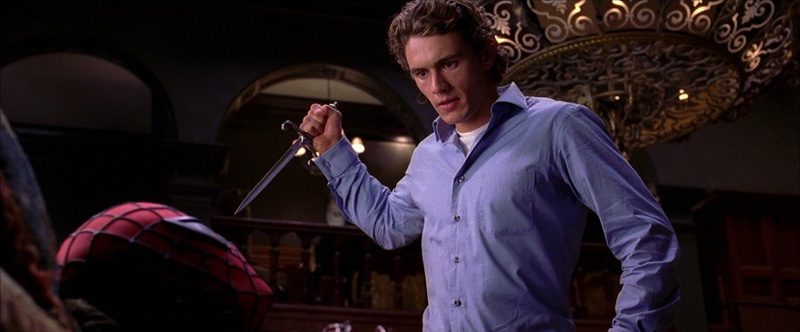

Rick: In my opinion, no one can ever match the cast of the Spider-Man from the ones that you mentioned. I wasn’t a fan of The Amazing Spider-Man films but I did enjoy Homecoming. The cast in Sam Raimi’s trilogy is perfect. Also, the choice to cast J.K. Simmons as J. Jonah Jameson is a highlight for me. Skipping over the third entry, Green Goblin and Dr. Octopus were and I think still are the best villains we’ve gotten from the Spider-Man films new and old. The story in the first two films are told very well and, if you take away all the action scenes (which no one wants to do), you still get a very interesting movie to watch.
Rick: Speaking of the cast, what moments stand out to you in Spider-Man 2? For me, the most memorable scene is the surgery ward. I never realized it until years later but this is a homage to Raimi’s Evil Dead. When I first saw the movie in theaters, the surgery scene always terrified me even more because it happens so fast and is very intense. I don’t think that the MCU would be brave enough to show a scene like this today. We see doctors getting killed (mostly offscreen) and hearing their screams is something I’d never thought would happen in a superhero film. It’s shocking and a great reference to Raini’s first film.
Ben: Agreed, the POV arm-cam moments were clever Evil Dead callbacks, as well as a fun Bruce Campbell cameo as a theater usher who denies Peter entry. But the cliche answer would have to be Spider-Man’s fight with Doc Ock on the train. Even all these years later it not only holds up, but could go toe-to-toe with most MCU fight scenes. The action is visceral, the web scenes are creative and it comes at a moment of triumph for Peter after he finally regains his abilities. Just because the battle’s scope is confined to a single train doesn’t mean it’s impact isn’t felt.
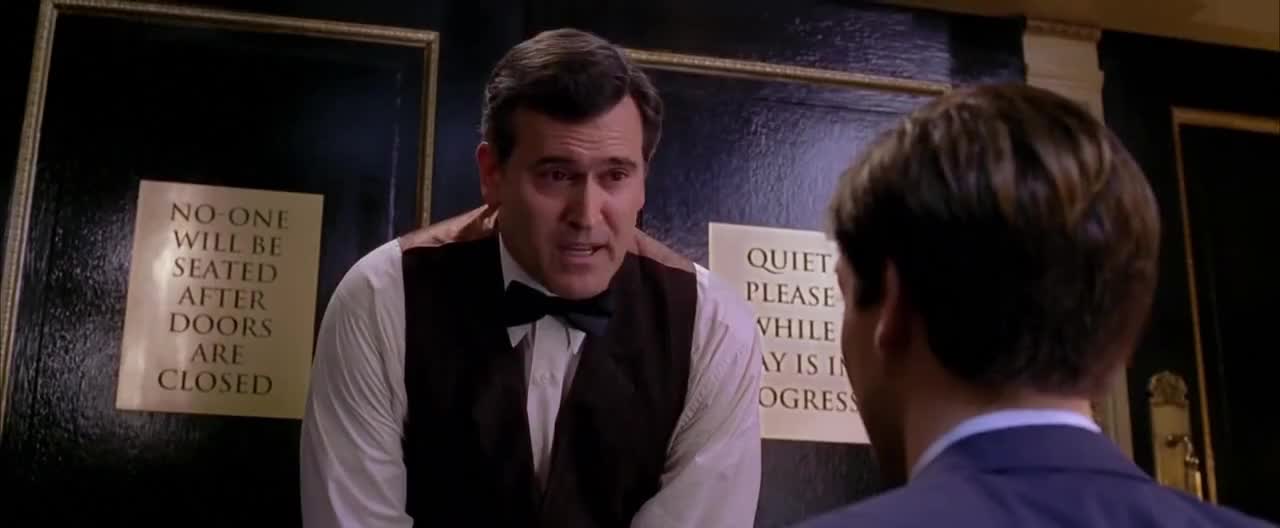

Rick: Yes! I love the train fight but for me even more impressive is the clock tower fight which happens right before the train. The build-up leading up to their confrontation sets up the fight perfectly. Mary Jane is taken away and Peter is given a choice: find Spider-Man or she dies. Then he’s violently thrown against the wall and regains his powers back. Once Spider-Man arrives at the clock tower, the audience knew that something awesome was going to happen. Getting back to what I was saying before, the villains are just well written and acted that I think they are still the best of the Spider-Man saga.
I remember seeing this in theaters fifteen years ago and the battle sequences still hold up. Especially the train battle. Everything about the fight between Doc Ock and Spider-Man is still iconic and easily the best of the trilogy, from the one-liners all the way to Peter saving of the train from falling over the edge of the bridge. Rami also made us grip the edge of our seats after Harry discovers the man supposedly responsible for his father’s death was his best friend. Just the reaction from Harry alone builds up for a sequel, despite it not being at the caliber of its predecessor.
Ben: Agreed. And a lot of this drama stems not just from Peter’s moral dilemma, but the characterization of Otto Octavius. Alfred Molina has the occasional moment of hamminess, but tonally he feels like the opposite of Willem Defoe’s scenery-chewing Green Goblin performance. This is a more nuanced and tragic villainy from someone whom Peter greatly admired, but lost everything due to his own experiment and, in his hubris, believed he could do it again regardless of the risks. The “talking” arms are kind of goofy but Molina sells the tragedy of this character, much like Ian McKellin did with Magneto in X-Men.
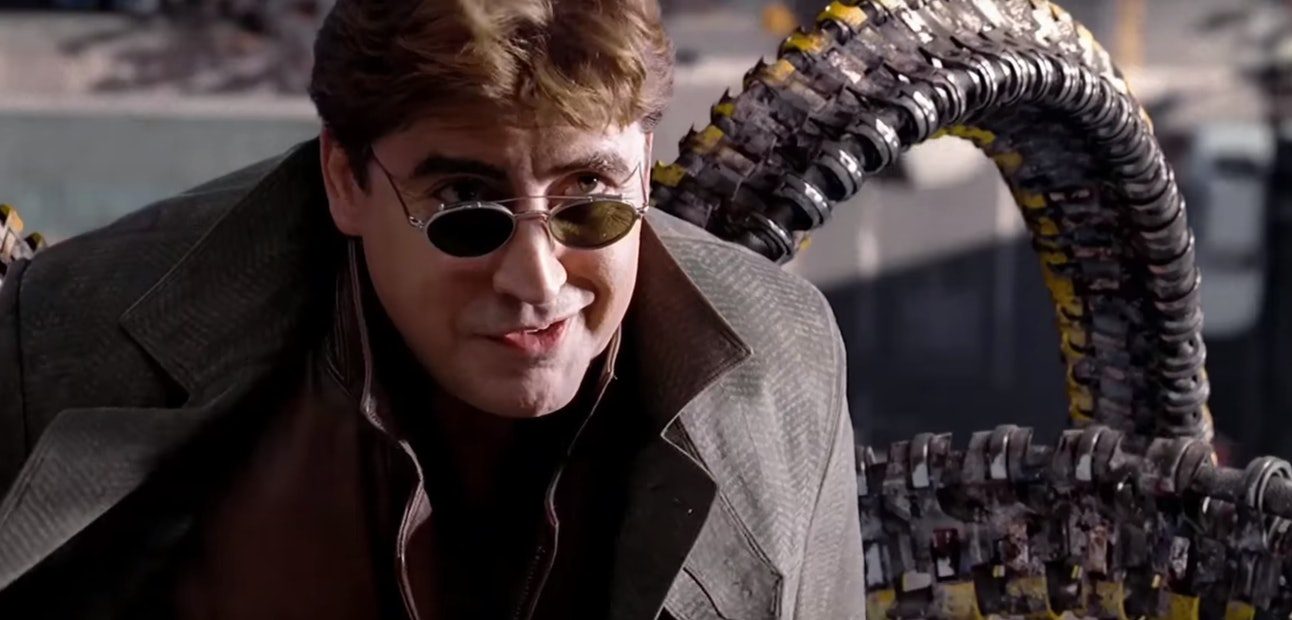

Drew: Honestly the Rami films did not hold up as far as dialogue. They didn’t age well in that department and this was a problem with all three films, especially for fans who wanted more competent superhero films. Defoe and Molina were wonderful but the films definitely have camp and are sadly aging as time marches on. The worst of this came to fruition in the sequel.
Rick: I don’t agree. I love the writing in the first two entries because they feel like they told a story very well. I think that Raimi’s films have aged quite well in fact. It’s got the best looking outfit for Spider-Man and, while some lines can be considered cheesy, I think the later Spider-Man movies don’t hold a candle to these ones. Simply because The Amazing Spider-Man essentially copied the first film and Homecoming is entertaining but one can’t forget the movie that started it all for us. Personally, the first two movies are competent enough in my book, part three is the one that went all weird. I compare Spider-Man 2 with The Dark Knight of superhero films. The Dark Knight is the winner of DC films while Spider-Man 1 and 2 are the best of Marvel.
Ben: Funny you mention the descent into weird because, until Spider-Man: Into the Spider-Verse, Spider-Man 2 remained THE best film in the wall-crawler’s line-up. The Mark Webb films had good performances from Andrew Garfield and Emma Stone, but their plots were a mess. Homecoming gave us a Peter Parker/Spider-Man to surpass Maguire, but his adventure was more “slice of life” than revolutionary. Hell, even the video game adaptation of Spider-Man 2 set a bar so high that it took until last year’s PS4 title to be surpassed. The fact that we kept this entry in such high regard, despite its inherent campiness, says something about the character’s enduring popularity.
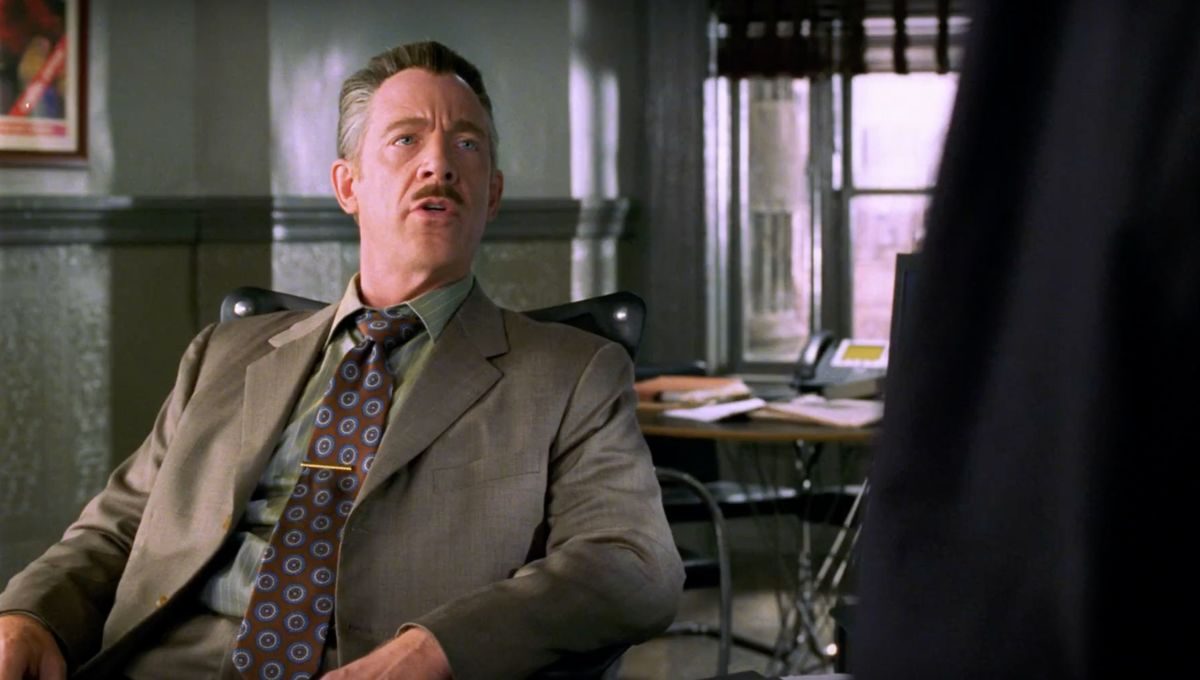

Rick: Yes, I’ll agree that Tom Holland fits the character well as a young Peter Parker. I haven’t played the new Spider-Man game but I recall playing Spider-Man 2 on Xbox back in the day and it was fantastic. It captured the city of New York and the villains included. It had been many years since I’d seen Spider-Man 2 and just sitting down to watch it again brought me right back to my childhood when I saw it in theaters. I laughed, I cheered, and it reminded me why I loved these movies years ago.
Sure, I like superhero films but honestly I’m getting bored because it’s the same thing year after year. There are some good ones though but, speaking of the new Spider-Man Far From Home releasing soon, it looks cool but doesn’t capture my heart quite like Spider-Man 2. In fact, go back and watch the trailer for that movie. It literally gave me goosebumps when watching it. I like this Tom Holland guy, his new suits and gadgets but it does make me sad when people say that Garfield and Holland are the best Spider-Man and not giving credit to Maguire, who is the best in my opinion. I’ll bet you anything that if Spider-Man or Spider-Man 2 returned to theaters, it would be a big hit. You can’t forget the one that made us look forward to summer movies within the superhero genre.
Drew: Honestly I think all the Spider-Man films differentiate. The Rami films have flaws but that doesn’t make them bad movies. In many ways they remind me of the Richard Donner Superman films. Great for their time but they did not have the technology or the writing to be viewed competently. I also believe Spider-Man has been tossed around by Hollywood for quite some time that it divided the fan base but, truthfully, Maguire left more of an impact on me than Holland or Garfield. It is very difficult not to associate this film with the other incarnations.
Ben: Then I suppose we can agree on this: for all of the Raimi Spider-Man film’s visual or dialogue flaws, they, and Spider-Man 2 in particular, captured the essence of Spider-Man’s appeal better than anything that came before or after. Let’s all hope Spider-Man: Far From Home comes close enough in recapturing that magic.
